Information for Patients
Faecal Immunochemical Test (qFIT) for Occult Blood in Faecal Samples
What is being tested?
The faecal immunochemical test (qFIT) checks for blood in your faeces. Normally, only a very small amount of blood is lost in the stomach or intestines. This is less than you can see in your faeces and is not enough to be detected with a FIT test.
A positive FIT test will tell your doctor that you have bleeding occurring somewhere in your gastrointestinal tract. This blood loss could be due to ulcers, bulges, polyps, inflammatory bowel disease, haemorrhoids (piles), swallowed blood from bleeding gums or nosebleeds, or it could be due to early bowel cancer. Anything that sticks out into the intestine, like a polyp or tumour, and is rubbed against by the faeces as it passes through, has the potential to bleed now and again. Often this small amount of blood is the first, and sometimes the only, symptom of early bowel cancer.
Which patients are eligible for FIT?
The main use for the FIT test is as to find early bowel cancer. Blood in the stool may be the only symptom of early cancer. If the cancer is detected before it spreads to other areas, there is a greater chance it will be cured. The signs and symptoms of bowel cancer are not always easy to see. In some patients, with an abdominal or rectal mass, rectal bleeding, anal ulceration or if they are age >60 y with iron deficiency anaemia. Your GP will request you are seen by the hospital urgently as a “two week wait patient” and you will not be offered a FIT test. In other patients where the signs and symptoms are less clear your GP may think you could have bowel cancer but wants to be more certain that this is the case. In these circumstances a FIT test will help them decide.
You also need to meet some other criteria to be offered the test; these criteria have been developed by the National Institute for Clinical Excellence and local cancer services after reviewing all the evidence.
- • Weight loss, abdominal pain, change in bowel habit (age >40 years)
• Iron deficiency anaemia (age <60 years) or a non-iron deficiency anaemia (age >60 years)
• Change in bowel habit or other symptoms that could be caused by colorectal cancer but are low risk (age >18 years)
How do you get tested?
Your GP will give you a pack containing all the information and equipment you need to collect your faecal sample and send it directly to the laboratory or return it to the GP practice to forward to the laboratory
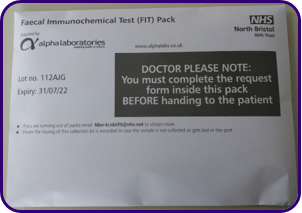
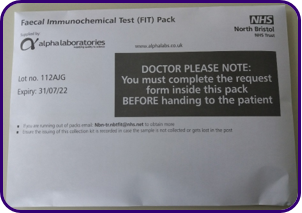
Inside the pack you will find the
• Collection device
• Request form (for return to GP pack this will be generated by the practice)
• Instruction sheet
• Return envelope
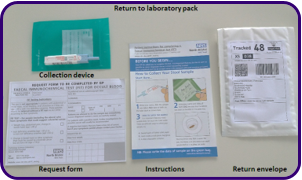
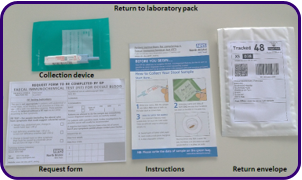
Your GP should have completed the request form, if this has not been done then please ask the practice to do this for you.
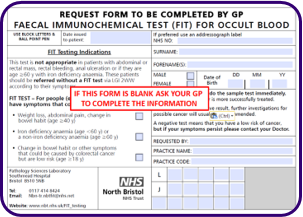
Read the instructions carefully
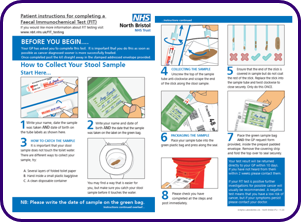
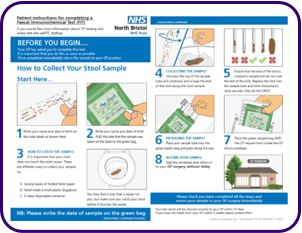
Click here to see a full sized version of the instructions:
When you have collected your sample
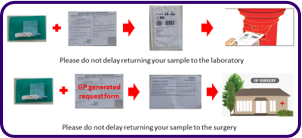
How soon can I expect the results?
GP’s will receive the results of the analysis within 7 working days from the date the test is sent to the laboratory. Your GP may then need to decide what is the next best step for you but if you have not heard within 10-14 days please contact the practice.
What do the results mean?
If the Faecal occult blood test is negative: If your result is negative (Faecal occult blood (FIT) <10 μg Hb/g faeces) it is very unlikely you have bowel cancer. You therefore do not need referral for suspected bowel cancer. If your GP is concerned that worrying symptoms persist they may do further tests or refer you for specialist advice. This will be done in line with local arrangements.
If the Faecal occult blood test is positive: If your result is positive (Faecal occult blood (FIT) >10 μg Hb/g faeces), this does not necessarily 'prove' that you have cancer. There are other possible causes of bleeding and other follow-up procedures will need to be done to find the source of the bleeding. Your GP is likely to refer you for further investigations and this may be done urgently
Where can I access further information and support?
• For more information about FIT the following website might be of interest: www.faecal-immunochemical-test.co.uk/
• For more general information about laboratory tests: https://labtestsonline.org.uk/

To contact the laboratory who are going to process your sample?
Please email the laboratory on nbn-tr.nbtfit@nhs.net
Page updated 28/09/21
Test Information
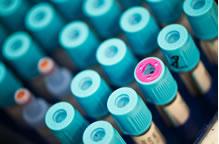
Includes details of sample types, volumes, special precautions, turnaround times & reference ranges.
